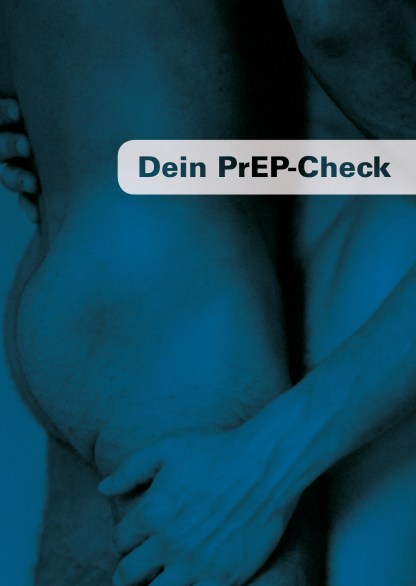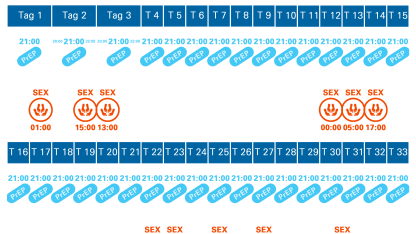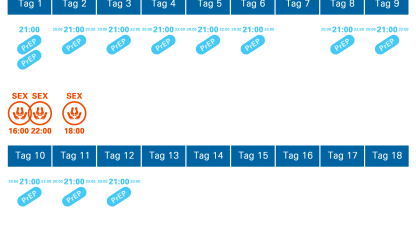PrEP
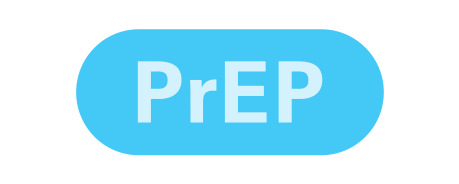
In a nutshell:
Pre-Exposure Prophylaxis is another approach to preventing an HIV infection and means "pre-risk prevention". If you are HIV-negative you can take medication that prevents you from becoming infected with HIV. Before you go on PrEP, you should get an in-depth consultation. Since PrEP is only for HIV-negative people, it is crucial to have an HIV test done before you start PrEP and every three months thereafter. You also need to have your kidney function checked beforehand. On top of that make sure that you do not have an undiscovered infection with hepatitis B.
What does PrEP mean?
"PrEP" stands for "pre-exposure prophylaxis" and means a "pre-risk prevention". It is a strategy for an HIV-negative person to protect him- or herself from an infection with HIV by regularly taking certain medication.
PrEP is sometimes confused with PEP (post-exposure prophylaxis). With PEP though, you start taking medication shortly after a risky situation for a period of four weeks to prevent an infection - not before as with PrEP.
How does PrEP work?
The PrEP drug contains the two active components Emtricitabine and Tenofovirdisoproxil which prevent HIV from multiplying in specific cells of the immune system, thus preventing an infection, even if the virus enters the body. So you remain HIV-negative.
Who is PrEP for?
PrEP is for anyone who is at substantial risk of contracting HIV. If you are having sex with multiple partners, if you have had an STI recently, if you do not use condoms during anal sex, if your sex partner is HIV-positive but doesn’t get treatment, or if you use substances during sex, PrEP could be an option for you.
Does PrEP also protect against other STIs?
No. PrEP does not protect against syphilis, gonorrhoea, chlamydia, and other infections. Here condoms can provide some kind of protection.
How do I start with PrEP; what do I have to keep in mind?
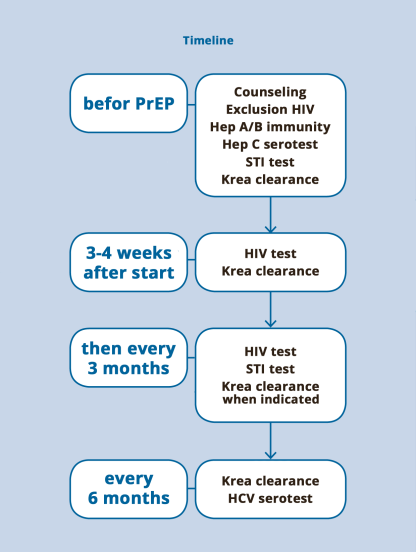
- The most important requirement for starting PrEP is that you are HIV-negative. To be sure that you are not HIV-positive before taking PrEP, an HIV test (HIV antibody/antigen combination test) is required.
- You start with an in-depth, personal consultation.
- You should also get tested for hepatitis B and C. (If not already done, get vaccinated against hepatitis A and B).
- A check of the kidney function ("creatinine clearance") is also important. This is a simple blood test. This way you can see if you already have problems with your kidneys and whether this needs to be investigated further. At the same time this test pre-PrEP serves as a baseline for future kidney test results. You can check whether PrEP has a harmful effect on your kidneys.
- If you have several sex partners, it’s a good idea to also get tested for syphilis, gonorrhoea, and chlamydia .
- If everything is fine, you‘ll get a prescription for a four-week treatment.
- 3-4 weeks after you started taking PrEP, the consulting doctor will do another HIV test in order to safely close the diagnostic gap since the last risky situation. In addition, the kidneys will be tested to see if there are any changes that would require a break in taking PrEP.
- If everything is fine, you get another prescription, now for 90 days worth of treatment.
- After that, it is sufficient to do a test for HIV, other STIs and creatinine every three months.
What (specialized) physicians are familiar with PrEP?
You can find a list of doctors in the menu link PrEP doctors.
How is PrEP taken?
The recommended way is to take one pill every day, preferably every 24 hours with a meal. After a few days, a sufficient level of active components will have built up in the body. This level remains constant if you keep taking one tablet every day. In case you want to stop taking PrEP, the tablets should be taken for two more days after last having had sex to extend an effective level of the treatment. You can find more information about daily PrEP here.
Daily PrEP is not an option for everyone. Some may wish to use a different schedule ("Event-based PrEP"). You can find more about taking it on demand here.
What are the possible side effects?
Most people tolerate the medicine well and feel few or no side effects. Side effects may include a mild headache, nausea, upset stomach, or diarrhoea, but these should go away after a few days. In addition, taking PrEP can have an effect on your kidney function. For healthy people this is usually not a problem. In order to find out that everything is OK with your kidneys, a blood test is carried out before starting and while being on PrEP.
Why regular HIV tests?
If PrEP is not taken correctly, an HIV infection may occur. If the infection is not detected in time, HIV can become resistant (insensitive) to the combination of the active components of PrEP. The medication then can no longer be used to treat the HIV infection. It is therefore of utmost importance to have an HIV test done immediately before starting on PrEP and at least every 3 months while on PrEP. If you have different sex partners, it is a good idea to also have an STI check performed regularly, so as to treat those bacterial infections immediately.
How do I get PrEP and who pays for it?
As a member of a public health insurance:
Since September 1, 2019, all necessary costs for PrEP are covered by your health care provider. However, this is only possible through doctors who are familiar with the treatment of HIV patients and/or with PrEP (see above or click on prep.jetzt and the dagnä homepage). The cost coverage for people aged 16 years or older includes the consultation, the accompanying tests, including STI checks, every three months and the medication for which you receive a prescription. You can this prescription filled at any pharmacy while paying the usual prescription fee of 5 to 10 Euros - if you are not exempt from this.
As a member of a private health insurance:
Private health insurance companies are not obliged to cover the costs for PrEP. To that end, there may be different and individual regulations that you should clarify with your private health care provider. It is however possible for you to still obtain PrEP at your own expense (consultation, examinations and private prescription) from the respective doctors.
If and indeed when PrEP is an option for you, you should discuss this with a doctor who specialises in HIV or with a counsellor in a counselling centre or checkpoint.
We strongly advise against any self-experimentation, because without medical advice and the accompanying tests, taking PrEP involves considerable risks.
Useful PrEP tools
To help you maintain control over the process, the appointments, your test data and taking the pill, we can recommend 2 options:
- the "PrEP-Check". This is a small booklet where you can enter all your data.
- the "prepared" app. If you enter all your data correcrly, not only will the app remind you to take your medication, but it will also keep you on top of your appointments with your doctor. You can download the app here:
Stand: Juni 2020
Quelle: 0314 HIV Report.de der Deutschen Aids Hilfe e.V. / www.PrEP.jetzt / aidshilfe.de

Kai Eckstein
Share on



